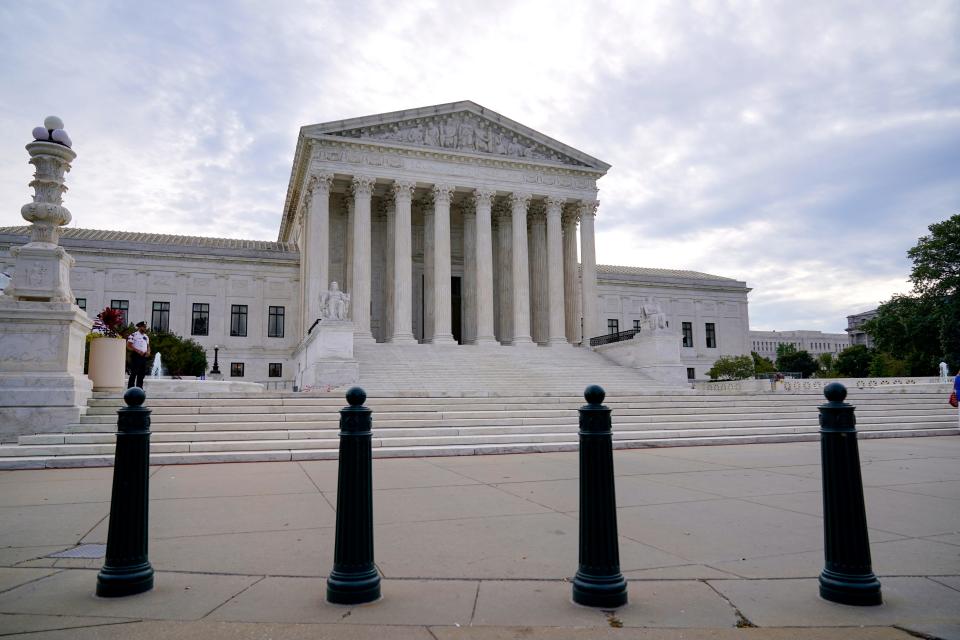Supreme Court's conservatives seem open to reinstating death penalty for Boston Marathon bomber
- Oops!Something went wrong.Please try again later.
- Oops!Something went wrong.Please try again later.
- Oops!Something went wrong.Please try again later.
WASHINGTON – Several conservatives on the Supreme Court signaled Wednesday that they support reinstating the death penalty for convicted Boston Marathon bomber Dzhokhar Tsarnaev, questioning the value of evidence that his defense said demonstrated his older brother was the mastermind of the attack.
In one of the most closely watched cases the high court will decide this term, the Biden administration seeks to overturn an appeals court ruling last year that concluded the trial judge erred when he blocked a jury from considering evidence that Tsarnaev's older brother had been implicated in a triple murder years before the 2013 marathon attack.
Tsarnaev's lawyers say the evidence was central to their effort to mitigate his sentence, suggesting his older brother was responsible for "radicalizing" him. But several of the Supreme Court's conservative justices countered that permitting evidence about Tamerlan Tsarnaev's role in what has come to be known as the "Waltham murders" would open up new questions about the reliability of that information.
More: Supreme Court wades into divisive death sentence for Boston Marathon bomber
Abortion, guns: Supreme Court returns to an explosive docket
"At a trial, you don't have these mini trials," Associate Justice Samuel Alito asserted during arguments that went well over the scheduled hour. "If a person's on trial for murder X, you don't have a trial about murder Y and murder Z."
Several members of the court's liberal wing, led by Associate Justice Elena Kagan, countered that weighing the value of evidence should have been a task for the jury.
"It's the job of the jury, isn't it, to decide on the reliability of the evidence?" Kagan said, pressing the lawyer who argued on behalf of the Biden administration. "To decide whether it's strong evidence or weak evidence that Tamerlan, in fact, played a leading role in those other gruesome murders?"
Tsarnaev's attorney, Ginger Anders, said the evidence was "central to the mitigation case" to lessen his sentence. Its exclusion, she said, "distorted the penalty phase here by enabling the government to present a deeply misleading account of the key issues of influence and leadership."
Eight years after the Boston Marathon bombing killed three people and injured more than 260, the Supreme Court case has divided Bostonians and tested President Joe Biden's opposition to capital punishment. At one point Wednesday, Associate Justice Amy Coney Barrett asked the government to explain its "end game" with Tsarnaev, given that the Justice Department placed a moratorium on federal executions in July.
"If you win, presumably that means that he is relegated to living under the threat of a death sentence that the government doesn't plan to carry out," Barrett asked. "So I'm just having trouble following the point."
Deputy Solicitor General Eric Feigin said that the administration's review of capital punishment would likely be finished by the time the government was ready to execute Tsarnaev. Feigin didn't address Barrett's broader point: What would happen if that review led to a more permanent suspension of executions?
Biden has voiced his personal concerns about capital punishment. It was the Trump administration, having resumed federal executions, that appealed to the Supreme Court and Biden's Justice Department is continuing to pursue the government's case.
Tsarnaev, 28, was convicted of dozens of crimes in the attack and received a death sentence in 2015. The Tsarnaev brothers also shot and killed Massachusetts Institute of Technology Police Officer Sean Collier.
Tamerlan Tsarnaev was killed in a shootout with police in a Boston suburb after the bombing.

Another question in the case, one that received less attention from the justices Wednesday, is whether the lower court erred when it declined to ask potential jurors specific questions about the proliferation of media content they had consumed in the wake of the bombing, such as what they had "read, seen, heard, or experienced" about the attack. Instead, the trial court permitted a more general question about whether jurors had formed an opinion based on the media coverage and whether they could set it aside.
The U.S. Court of Appeals for the 1st Circuit, which overturned the death sentence last year, ruled that those questions didn't go far enough to ensure an impartial jury.
Conservative justices, who have a 6-3 advantage on the court, declined to stop several federal executions that had been challenged through emergency appeals. The court's liberals balked in many of those cases, and Associate Justice Stephen Breyer renewed calls for a broader reexamination of the constitutionality of the death penalty.
The high court will hear arguments in another death penalty case next month centered on an inmate in Texas who asked that his preacher be permitted to pray audibly and hold his hand in the execution chamber. Texas has argued that permitting such interaction would interfere with the safety of the execution itself.
This article originally appeared on USA TODAY: Supreme Court appears open to death penalty for Boston Marathon bomber

